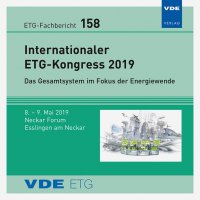Development of an electricity, heat and mobility concept at district level under consideration of sector coupling for the Lagarde Campus Bamberg
Konferenz: Internationaler ETG-Kongress 2019 - ETG-Fachtagung
08.05.2019 - 09.05.2019 in Esslingen am Neckar, Deutschland
Tagungsband: Internationaler ETG-Kongress 2019
Seiten: 6Sprache: EnglischTyp: PDF
Persönliche VDE-Mitglieder erhalten auf diesen Artikel 10% Rabatt
Autoren:
Then, Daniel (Stadtwerke Bamberg Energy- and Water supply company GmbH, Germany & Fraunhofer Institute for Energy Economics and Energy System Technology IEE, Kassel, Germany)
Loskarn, Stefan (Stadtwerke Bamberg Energy- and Water supply company GmbH, Germany)
Kaiser, Jan; von Appen, Jan; Kneiske, Tanja (Fraunhofer Institute for Energy Economics and Energy System Technology IEE, Kassel, Germany)
Buchholz, Sebastian; Stockinger, Volker (BUILD.ING Consultants + Innovators GmbH, Germany)
Muender, Mara; Schuetz, Astrid (University of Bamberg, Germany)
Inhalt:
The integration of electricity and heating systems as well as a large number of electric vehicles into existing grid infrastructure represents a challenging task for urban grid operators and energy service providers, but also offers flexibility potentials. The conversion process of the former Lagarde barracks in Bamberg depicts a blueprint for development of an integrated energy system. A conceptual design of a multi-energy system for the heat and power supply of a city district of approx. 20 ha. in the middle of already existing urban grid structures is presented. This covers the electrification of the heat generation including a district heating grid, the integration of high penetration of electric vehicles and PV systems, as well as the integration of a thermal storage under consideration of the overall system performance regarding CO2 emission and costs. The feasibility of a cross-sector implementation within the framework of the ambitious goals from the BMWi's funding context "Wärmenetze 4.0" will be examined. This includes both an analysis of possible energy concepts from a technical and economic point of view, as well as an examination of the non-technical needs and acceptance of future residents and various stakeholders.


